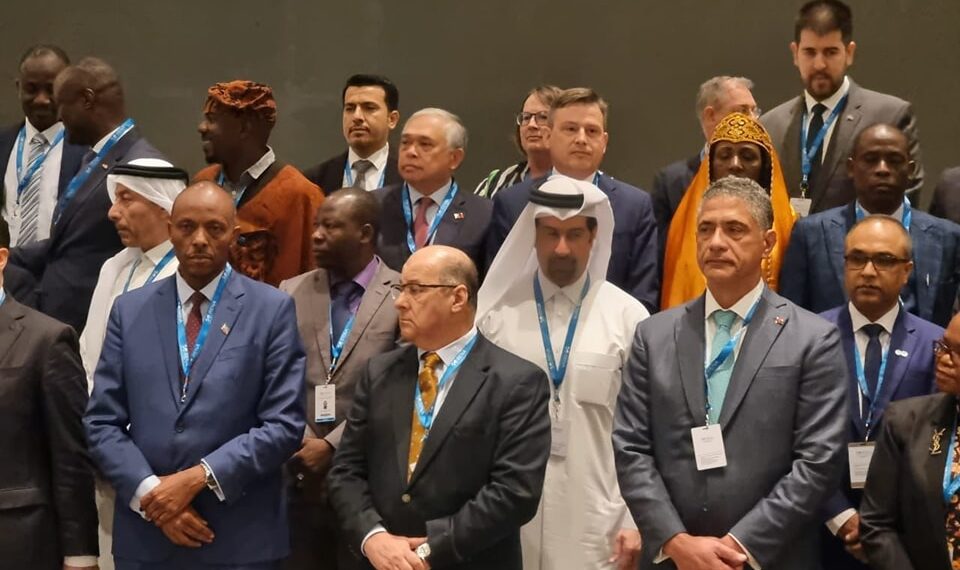The 14th Assembly of the International Renewable Energy Agency (IRENA) officially opened today, April 17, 2024, in Abu Dhabi, UAE. Angola serves as vice-president alongside the Dominican Republic, Georgia, and Iraq, under Rwanda’s leadership. Angola’s delegation was led by João Baptista Borges, Minister of Energy and Water, and Júlio Maiato, Angola’s Ambassador to the UAE and Permanent Representative to IRENA.
The day’s focus was on IRENA’s executive overview, presented during a high-level plenary session on tripling renewable energy, followed by official statements from member states. These statements included updates on the progress of renewable energy implementation across IRENA’s 169 member countries. As Angola’s Permanent Representative to IRENA, Ambassador Júlio Maiato facilitated the final session of the day.
Minister João Baptista Borges expressed satisfaction with Angola’s election to the vice-presidency and congratulated Rwanda for its leadership, as well as the Dominican Republic, Georgia, and Iraq for their roles as vice-presidents.
Borges emphasized the vulnerability of Africa to climate change, noting that Angola faces challenges such as drought, water scarcity, desertification, and weak infrastructure.
He highlighted Angola’s recent exponential growth in installed electricity generation capacity, which increased from 2.4 GW in 2015 to 6.2 GW in the last eight years. Hydropower generation has risen from 39% to 60%, while thermal energy dropped from 61% to 36%. This shift was largely due to key projects, including the completion of the Laúca Hydroelectric Plant (2 GW) and ongoing work on the Caculo-Cabaça Hydroelectric Plant, aiming for 9 GW of total capacity.
The minister also noted the progress in Angola’s energy restructuring, with the completion of the Biopio (188.80 MW) and Baía Farta (96.70 MW) solar plants in 2022, which now contribute around 4% to the national energy grid. These initiatives save 3 million tons of fossil fuels and reduce CO2 emissions by 9 million tons annually. He also mentioned the Caraculo Photovoltaic Plant (25 MW), with plans to scale it up to 50 MW.
Strategic efforts have led to a 43% electrification rate and a 60% reduction in diesel consumption at thermal plants, from 1.36 billion liters in 2015 to 560 million liters in 2023.
However, significant challenges remain in expanding the energy transmission network to distribute 2 GW of available energy, including enhancing intra-African energy trade with Namibia and the Democratic Republic of Congo. Angola is poised to benefit from selling surplus energy in regional markets.
Borges also highlighted ongoing reforms in the electricity sector, including the establishment of a legal framework for Independent Power Producers (IPPs), who now have the freedom to compete in the market and sell energy through Power Purchase Agreements with the public electricity sector.
He concluded by discussing the 2023-2027 Energy Sector Action Plan, aligned with Angola’s 2050 Long-Term Agenda, which aims to integrate 72% renewable energy into the national grid by 2027, including 1.2 GW of solar energy. The plan requires a $12 billion investment, with significant involvement from financial institutions and the private sector.
This year, the construction of photovoltaic solar parks is expected to boost solar capacity by 584.50 MW and add 90 MW with 25 MWh of battery storage.
Two new electrification projects have been approved for Angola’s eastern and southern provinces, aiming to provide electricity to over 6 million people across 132 localities through solar systems, storage solutions, and distribution networks, significantly reducing construction time.
On the sidelines of the Assembly, Minister João Baptista Borges held bilateral meetings with the Minister of Infrastructure and Mineral Resources of São Tomé and Príncipe to discuss Angola’s leadership in the Community of Portuguese Language Countries (CPLP), and with financial institutions like the IFC of the World Bank and the African Development Bank (ADB) to explore financing for sustainable energy solutions.
The minister also met with potential investors in renewable energy, focusing on rural solutions and private sector initiatives. These stakeholders expressed interest in collaborating with the Angolan government to advance the country’s sustainable energy transition, share knowledge, and implement new technologies.



